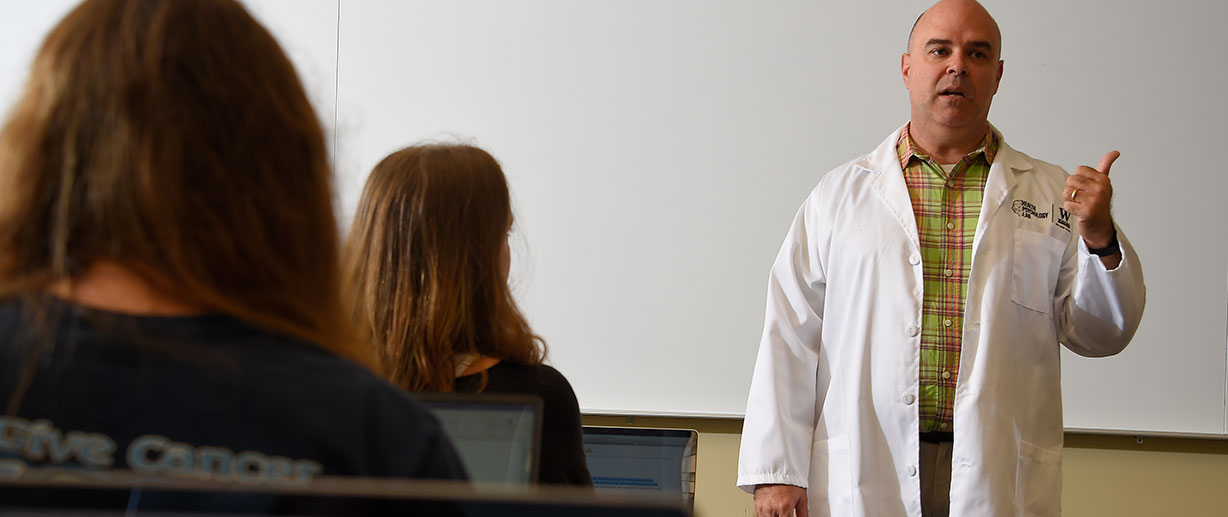SPARTANBURG, S.C. – Over the past 20 years, Wofford College students have been volunteering for a series of studies where they voluntarily experience pain. They were participants in student-led research with Dr. John C. Lefebvre, professor of psychology, studying pain and how worry can increase someone’s pain.
Lefebvre and his student researchers have been looking at pain and its relationship to worry and happiness, and how catastrophizing – the tendency to believe in the worst case possible – impacts pain. A paper by Lefebvre and a colleague at the University of Washington, “The Relationships between Worry, Happiness, and Pain Catastrophizing in the Experience of Acute Pain,” recently was published in the European Journal of Pain.
In the study, the students were split into two groups – one told to think about the last time they were really worried and the other told to think about the last time they were really happy. The two groups were exposed to the same pain stimuli, but those thinking about a worrisome time reported higher levels of pain. Those who were asked to think about a happy time showed a decrease in pain. “The interesting part is that neither group showed any difference before they were asked to think about the events,” Lefebvre says. “It was thoughts about worry or happiness that changed the experience of pain.
“What this means is that day to day, we recognize that when we worry about something – anything – it’s going to make your pain worse,” says Lefebvre, who became interested in the study of pain as a senior at McGill University and continued as a graduate student at Duke University. “So, some people may start doing things that are not necessarily healthy – drinking, taking pain meds, then worrying about how difficult it is to get pain meds or worrying about becoming addicted to the meds –and this all just makes the pain worse.”
It’s called catastrophizing, and it’s a hot topic in psychology these days. “Any time I go to a conference and there’s a session on catastrophizing, it’s packed. Clinicians hear this in their patients’ voices. They want to know what they can do.”
Most people don’t catastrophize much, he adds. “They have thoughts that make their pain worse, but you have to look at the level of that; most people don’t go to the level of catastrophizing. It’s sort of like depression, which is terrible, but only a small percentage of people have clinical depression. Most people have sadness on some level, so it’s on a continuum.”
Lefebvre began to think about that continuum and whether there was something else going on – whether worry that was not quite catastrophizing would still have an effect on someone’s pain level. “People usually are somewhere in between that and not worrying about their pain at all.”
When you have an injury, it’s normal to dwell on it, especially when there’s nothing else going on. Dwelling on it often seems to make that pain worse, but when you get busy with work or other tasks, you may tend to forget about the pain for a while.
Worry – and catastrophizing – are normal but uncomfortable, Lefebvre says. “The human brain is designed to look at our environment and recognize threats. Something as ordinary as pain is a threat to the ancient part of the brain – and how the brain processes pain can determine whether it causes one person to feel pain more intensely than others.
“What we think of as catastrophizing – worry, anxiety, depression, fear, panic – the brain focuses on the threat that makes us feel that way,” he adds. “The brain is doing what it’s designed to do, and our brain is really good at doing that. It’s how we survive.”
Lefebvre has been studying worry since he arrived at Wofford in 1999, and he’s always done his research alongside his students. “Research in general, the senior thesis in particular, are incredibly important for students, and not just to get them into graduate school. For psychology majors, we’re teaching them to work as a team, as colleagues. They are invested as co-workers, and we treat them as colleagues or graduate students. The senior thesis is probably the hardest, yet most rewarding, thing they’ll do. At the end, they will have a paper in their hands and can say, ‘I did this,’ but they also understand better what goes into research.”
Research also teaches students to not give up, “just pivot,” he adds. “They may find, after all their hard work and long hours, that what they were thinking is true is not true, but they learn even then that they didn’t fail, they just have to do something different.
“Science is not a thing; science is a way of thinking. Just like the humanities or the social sciences, it’s a valid way of thinking,” Lefebvre says. “That’s why a liberal arts college is important. It shows you different ways of thinking about the world, and graduates should have all those tools in their tool chests.”
